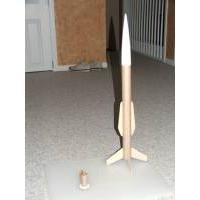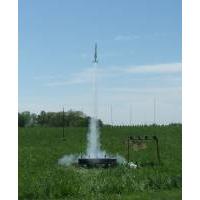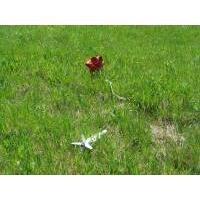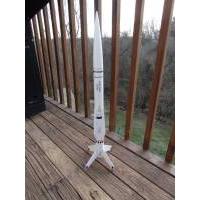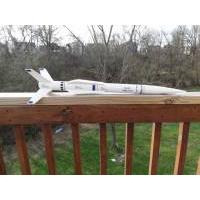| Construction Rating: | starstarstarstarstar |
| Flight Rating: | starstarstarstarstar |
| Overall Rating: | starstarstarstarstar |
| Published: | 2012-05-21 |
| Manufacturer: | Clone |
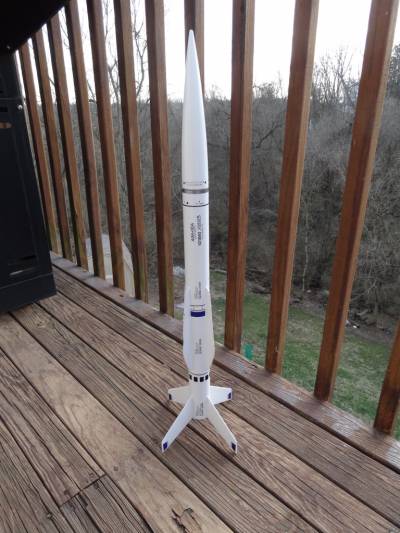 Brief
Brief
The Sentinel is a very convincing faux-missile produced by Estes from 1988 to 1994. Originally an 18mm bird, I built my clone with a 24mm mount, a decision that I've been quite happy with. Mine isn't a kit, but a clone built around an original PNC-60RL nose cone.
Components
- PNC-60RL nose cone
- 18" BT-60 body tube
- BT-50 motor tube
- 5060 centering rings (2)
- 2050 engine block
- Long Estes motor hook
- 36" length of 150# Kevlar shock cord
- 36" length of 1/8" sewing elastic shock cord
- 3/32" balsa fin stock
- medium snap swivel (2)
- 18" parachute (reefed)
- launch lug
Construction
Even with double the fins of a traditional 4fnc project, the Sentinel isn't a lot more difficult as long as you take care to keep the fins and strakes straight. I attached the bottom fin first using Elmer's wood glue, then attached the strake directly above the fin. From there I went to the opposite side and worked with that fin and strake, keeping the fin in a straight line with the opposite fin, and the strake straight with the fin. I repeated the process with the other two sets and it turned out pretty well.
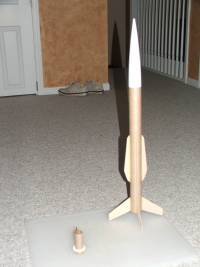
Finishing
The biggest pro with finishing this bird is the fact that except for a thin silver area around the top 1/8" of the body tube, this is an all white rocket. As I generally do with most of my builds, I sprayed the rocket with a coat of Valspar primer before beginning the sealing and sanding. After priming, I sealed the body tube and fins with two coats of thinned Elmer's Fill & Finish, sanding between each coat. After another coat of primer I sprayed the whole rocket with Valspar gloss white, then masked off the very top of the body tube for the silver accent. (Which is a really nice touch, btw.) I picked up a set of decals from Excelsior and was incredibly impressed with the finished look they gave to the rocket. Craftsmanship issues aside, this was one of the sharpest looking birds I've finished in a long time.
Then came the clear coat.
I wanted to protect the decals, so I picked up a can of Valspar Clear Acrylic. The white paint had been applied several weeks before, so it should have had plenty of time to dry, but when I sprayed on the clear, the paint immediately crazed in several spots. It's not fatal, but it sure takes away from that feeling of accomplishment I had when I wrote the previous paragraph.

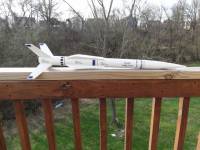
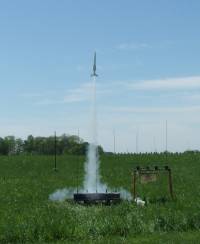

Flight
First flight was on an Estes D12-5 at what was then the QUARK home field, Voice of America Park. With a field of this size I had no qualms about going with the D12 for the first flight. The flight was arrow straight and plenty high with no curve into the light breeze. Recovery was something of a walk, but the reefed chute brought it down fairly quickly into the weeds off of the flight line. Somehow I managed to wind up with something of an Estes dent at the top of the body tube. Like the clearcoat crazing, not a deal breaker, but still an annoyance.
For the second flight a month later, I decided to go with an Estes E9-6. VOA was a great field for these long burning E motors, and in similar conditions to the D12 flight, the E9 turned in a similar performance. High and dead straight with a nice hike into the weeds. This time there was no damage on recovery.
The third flight was again on a D12, this time with a 7 second delay. The extra two seconds might have been a bad idea because after a picture perfect flight, I arrived at the landing area to find that the Kevlar had cut through one of the fins on recovery, slicing through the glue fillet for 2/3 of the length of the fin root. Repair was simple, but the results were noticeable.
Summary
Pros: Despite the mostly white paint scheme, this is a great looking rocket when completed. Decals from Excelsior really set the whole scheme off. Performance with the 24mm engine is a huge improvement for large fields.
Cons: None, except that it's out of production.
Related Products
 |
 |
Flights
Sponsored Ads
 |
 |
